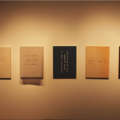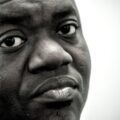The Collected Letters of Robinson Jeffers

The Collected Letters of Robinson Jeffers
edited by James Karman
Hardcover, $95
Stanford, 2009-11
The recently published multi-volume Collected Poetry of Robinson Jeffers, with easy to read large font in generous layout, is lavish in its design, and the ongoing multi-volume Collected Letters of Robinson Jeffers follows accordingly. These volumes are resplendent with photographs and detailed footnotes, finally allowing ample opportunity for readers to discover or re-discover this exemplar poet, one of California’s strongest, an undeniably unique poetic voice.
Never comfortable identifying himself with any group, Jeffers is a poet of resolute individual will. Not in the least attracted to the experimental avant-garde lyric or collage-like long poem that was prevalent among poets of his time, Jeffers instead re-cast tales of Greek, as well as Christian, myth and literature (Cassandra, Clytemnestra, Oedipus, Tamar) onto true-to-life situations which he either personally encountered, heard tell, or imagined.
Jeffers is an ardently religious poet, but he was certainly not a church-going man — seeing the hypocrisy in religious institutions, his faith was of a more individual order. God plays a central role in all of Jeffers’ work, including his conception of “Inhumanism,” which downplays the centrality of humankind’s importance in favor of a higher deity to be found manifest in the natural world. In his view, God not only challenges the narcissism that Jeffers saw in English and American poetry (a narcissism that emerges from the traditions of Romanticism) but also overwhelms it. Jeffers’ God is individual and isolating in conception as well as practice: a God that no poet’s work is capable of encapsulating.
The beauty that Jeffers encounters in Carmel, on the California central coast, spurred nearly all the poetry he wrote. His unique relation to nature, and its correlative Inhuminst moral theory, remains the most compelling aspect of his life and work. Located just south of Monterey and a bit north of Big Sur, Carmel is a coastal nook of deep wooded ravines and craggy nooks where fir trees, massive rock formations, and dairy cows mingle and extend right up against eye-catching views of the Pacific as waves crash at the shore below. Today Carmel is a small resort town, which grew up around the stone house and tower that Jeffers built by hand (he indentured himself to local masons and hauled the stones up from the beach). The building was a gift to his wife, Una, who was enamored of medieval Irish towers. Una, in fact, penned the majority of Jeffers correspondence — here she describes their homestead in Carmel in a 1932 letter:
It was then too he did his first manual labor. We had bought the land on the cliff here outside the village in spring 1919 and had let the contract for a small stone house (finished early Aug 1919) it was far outside the village & was going so slowly we decided to try to get the contractor to hire R.J. so that he could keep an eye on the men. — He hadn’t any of the skill of any kind so he did the hardest and plainest job, — (at $4.00 a day I think) — mixed mortar and carried the hod to the master mason. — It was thus he learned to handle stone and learn the trade (craft!) of mason which led to years of building (garage, tower, walls etc) These things I have mentioned were all disciplinary — and he never encountered discipline really before.
The marriage of Robinson and Una is, arguably, as integral to the poetry Jeffers produced as the coastline or his theology were. Una provided the life-blood of nearly every line that Jeffers wrote, as both spur and imaginative companion. She also provided a balance between the essential elements of their life, managing the practical affairs of the outside world without allowing them to intrude into the home they shared with twin sons Garth and Donnan — a home which Jeffers slunk into as refuge from the troublesome world beyond. Una handled nearly all the correspondence herself, and the letters make it clear that Una’s role was not only that of wife, mother, and homemaker, but clearly also secretary and manager of the poet’s business. Jeffers took little interest in the distraction of social affairs.
In the rare circumstance that Jeffers himself authors any of these letters, he’s generally addressing a peer, such as Edward Arlington Robinson, Edgar Lee Masters, or Edna St. Vincent Millay, expressing his admiration for recent publication of theirs or thanking them for a recent visit. On other occasions, he’s corresponding to a publisher or editor, acknowledging or turning down a professional duty such as judging a literary award or accepting such award himself, acquiescing to a solicitation for new poems, or demonstrating his solidly rather curmudgeonly position about his standing as public sponsor for poetry programs: “I feel honored that you would like to add my name to your list of sponsors, but perhaps it would be better for one who writes poetry not to stand sponsor for a movement that will be seeking funds for the reward and support of poets.” Jeffers as correspondent does not add much mirth to the already stolid image provided by Jeffers as poet. In some instances, he offers feedback to students or literary critics who have sent him the essays they’ve written on his work. These offer more insight into the writing of poems, and demonstrate a willingness to allow, and even welcome, broad interpretations of them:
. . .that is one of the reasons for writing a poem — to give the reader a chance to superimpose his own ideas on it. It seems to me that if it is a good poem — good enough to stand on its own feet — then the author’s own understanding of it has no more authority than any other competent person’s.
Rarely are any of Jeffers’ own letters personal in the least. The lengthiest personal correspondence is a letter he wrote to Una’s parents at the beginning of a six-month journey abroad to Ireland and England, in 1937. Even here, his tone remains matter-of-fact, betrayed only by some amount of pride he takes in noting that none of the Jeffers family got sea-sick on rough boat rides to nearby islands:
The other day we went in an eighteen-foot motor-boat to Tory Island, a dozen miles off the coast here, where there is a fishing-village of 200 people or so, very wild and dirty, an ancient round tower, and a lighthouse. We walked around the island and were shown over the lighthouse. The passage was quite smooth on the way out, but two or three people were seasick. We were not. On the way back the waves were against us, they flew over the boat and soaked us all to the skin, but nobody was sick. When we were in Galway some days ago we went out to the Aran Islands in a small steamer. That was really a rough passage; the boat nearly stood on her head. All the passengers were sick except ourselves [. . .] There were a few Aran-islanders on board and they were sick too.
Una’s letters, by contrast, demonstrate charm and persistent humor. She kept herself considerably amused by relaying anecdotes and incidental gossip. These are the letters that tell us most about the family’s life and their character. One such letter concerning the too-little-known anthropologist, shaman, poet, and translator Jaime de Angulo shows the liveliness of Una’s writing:
Now I am going to write something INDEDECENT really so if you happen to be reading this aloud, don’t! — It’s about Jaime de Angulo. You remember I told you Noël said all that went on that Sunday when Myron & Langston was along surpassed any of his worst experiences. — Jaime was drunk from the time they arrived & kept on getting worse & drumming on a big drum all the time. Finally he said to Myron. “I’m a Jew too I can prove it” & began to yank at his trousers the only garment he had on — they suspected his purpose & diverted his mind—but while they were at [the] lunch table he thought of it again & suddenly got out his circumcised member & propped it up on the table to prove his Jewry. — Now what would you have done in that emergency? There were no other events as bad. I don’t believe I’ll go up there, ever. I would hate to throw red pepper on it but that’s a proper method for such creatures as my father once demonstrated in old pioneer days. It cures exhibitionists! Easier than psycho-analyzing them.
The activity of writing was clearly a job for Jeffers. It was his occupation, just as another might manage a farm or raise livestock. He had not always planned to make a living from his art, yet once he received a positive reception and saw that publishers would pay him for his books, he pursued financial rewards. Yet with the economic collapse of the Great Depression, Jeffers’ original publisher, Horace Liveright, went under; it was Random House, under the leadership of Bennett Cerf, which took up Jeffers as an author — leading to publication of The Selected Poetry of Robinson Jeffers in 1938. Cerf’s steadfastness and loyalty to promoting Jeffers’ poetry is clear throughout their correspondence, conducted mainly through Una.
Poetry provided Jeffers with a medium through which he came to recognize certain, he felt, elemental truths about human relations — within ourselves and with each other, as well as with the forms of divine manifestation in the natural world. He continuously weighs and re-weighs the divinity apparent in the landscape surrounding him and humanity’s actions in the face of it, as in this 1936 letter:
If God is all, he must be suffering, since an unreckoned part of the universe is always suffering. But his suffering must be self-inflicted, for he is all; there is no one outside of him to inflict it. — I suppose the idea carries psychological as well as cosmic or religious implications. Man as well as God must suffer in order to discover; and it is often voluntary — self-inflicted — suffering.
There is no escaping the resolute fact of life and death, and nearly all of Jeffers poems are an exploration of one or the other. At root, his work rests upon a fundamental belief that it’s all meant to happen, the bad and the good, that all is deserved. Passing blame was not something Jeffers went for.
It is unavoidable in any discussion of this volume not to mention one nearly fatal, tragic event. Literary cosmopolite Mabel Dodge Luhan was an ardent patron of Jeffers and also a supporter of D.H. Lawrence, who, along with Frieda Lawrence, lived near her in Taos, New Mexico. Throughout the 1930s, the Jeffers family made yearly visits to Luhan’s ranch. Una loved to gossip, and she enjoyed Luhan’s ever-whirling elite social world; it was Luhan to whom Una wrote the anecdote concerning de Angulo. In 1939, a married socialite named Hildegaard, who had recently finished a mildly scandalous affair with a younger acquaintance of her husband, arrived in Taos in the midst of a visit by the Jeffers. She and Robinson began some kind of affair, which may or may not have been consummated. Luhan wrote her own version of the events, which is extensively quoted in notes to the relevant letters. The relationship lasted only a couple of weeks, but it was enough time for Una, enraged, to inflict a gunshot wound upon herself, combined with a handful of sleeping pills. Luckily, she was discovered by Robinson in time and survived the ordeal. Robinson wrote to Hildegarrd following the event — the last letter apparently went undestroyed, despite his request that it be so — indicating that, though he indeed felt something for Hildegaard, he yet was never going to leave Una.
The Jeffers’ marriage was as full of ups and downs, as any marriage is, but the shared stoic vision and rich imagination which bonded Una and Robinson was inescapable. Still, it is surprising to find Jeffers helplessly full of self-pity in certain undated letters to Una. For instance, this note was scrawled “on back of a Life Magazine subscription notice dated October 21, 1939: “I CAN’T WRITE. I feel completely half-witted (not to diagnose the case) and ‘writing’ — during the past 30 years — has become one of the conditions of life for me.” Jeffers knows “something will change, something will happen.” He understands time will shift the current order of things, but he remains plagued by Una’s attempted suicide, even as he acknowledges his own self-absorbtion: “You were insensitive in Taos. — You thought too much about yourself, — as I am doing now.” It is a crass sentiment, which serves most usefully as a reminder that beneath even the most remote exterior, there is an emotionally-charged human lurking — a fact which even Jeffers couldn’t escape, not even by immersion in the Inhumanist world of his own poetry.
Robinson Jeffers lived as he wrote: he would abide nothing in excess of what he felt was required to meet his own satisfaction. He did not court or otherwise seek the acclaim and/or notoriety that nonetheless came to him. Nor did he gather solace from becoming part of any literary or artistic movement. Though he experienced a meteoric rise in public acclaim during his lifetime, over the last few decades his renown has generally sunk. There is a small, dedicated following of committed scholars, poets, and faithful readers of poetry, but he is no favorite of today’s literati. Jeffers wrote poems that present both an unrelenting portrayal of some of the darkest themes (rape, incest, bestiality, matricide) as well as a celebration of the tremendous beauty he found in the natural landscape around him, and his portrayal of terrible events set in such splendor offers to readers a mixed bag of attraction and repulsion. Poets coming after Jeffers have both identified with his angst and, usually, rejected his anti-humanist conclusions, even as their own writing moves towards a greater consciousness of relation with the natural world. However, Jeffers’ work remains vividly striking and his reputation has never shown signs of completely fading. The raw power of his poems, the vividly aggressive strength they value and pay honor to, is as striking as ever; as these lines from his poem “The Hurt Hawk” attest:
He is strong and pain is worse to the strong, incapacity is worse.
At distance, no power but death the redeemer will humble that head,
The intrepid readiness, the terrible eyes.
The wild God of the world is sometimes merciful to those
That ask mercy, not often to the arrogant.
You do not know him, you communal people, or you have forgotten him;
Intemperate and savage, the hawk remembers him;
Beautiful and wild, the hawks, and men that are dying, remember him.
About Patrick Dunagan
Patrick James Dunagan lives in San Francisco and works in Gleeson library at USF. His latest book is There Are People Who Think That Painter's Shouldn't Talk: A GUSTONBOOK (Post Apollo, 2011). Other writings appear (or expected) in 1913, A Journal of Forms, Amerarcana, Greetings, House Organ, Lightning'd Press House Mag, and elsewhere.





